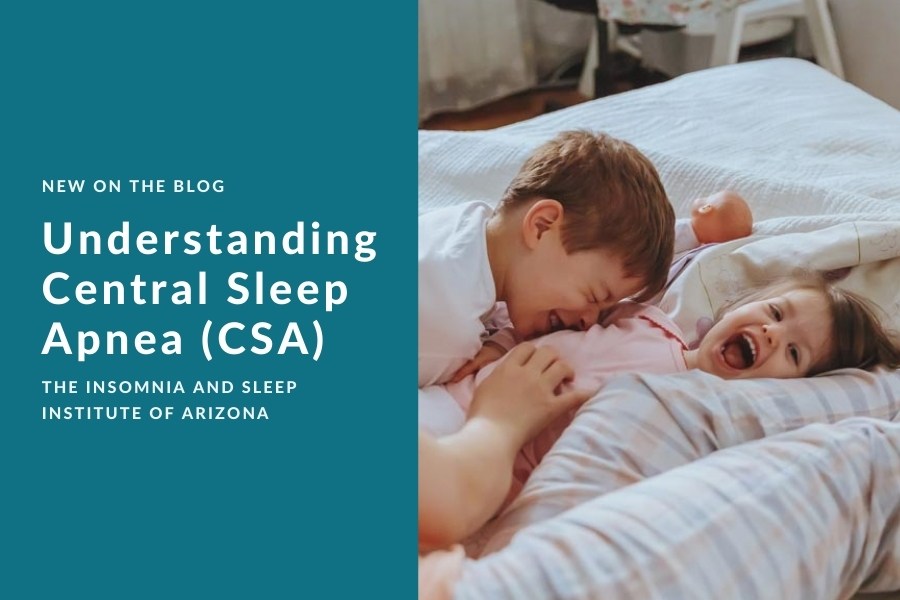There are different types of sleep apnea, and The Insomnia and Sleep Institute of Arizona treats all sleep disorders including central sleep apnea (CSA). This is a disorder where breathing routinely stops and starts when a person is asleep. Rather than a physical obstruction causing this type of apnea, it occurs because the brain isn’t sending the correct signals to the muscles that are managing the breathing effort. There is also obstructive sleep apnea (OSA), which occurs because of an obstruction in the upper airways. OSA is much more common, but central sleep apnea is still quite prevalent—and dangerous if not managed.
Although central sleep apnea can occur by itself, it can also be caused by other conditions like a past stroke or heart failure. In some cases, sleeping at a high altitude can cause sleep apnea. There are a number of treatment options available, such as a CPAP machine (and of course treating conditions that might be causing it), but the first step is a correct diagnosis.
Where You Treat Central Sleep Apnea Matters
The Insomnia and Sleep Institute was voted “Top Doc” in the region for the past six consecutive years and is recognized as the “Face of Sleep Medicine” in the Phoenix area. We are staffed by sleep specialists concentrating in sleep medicine, offering unprecedented staffing levels with three sleep specialists, a clinical psychologist focused on cognitive behavioral therapy for insomnia, and physician assistants, respiratory therapists, and nurse practitioners with strong backgrounds in sleep medicine.
We are driven by outcomes, and that requires the right diagnosis. That is why consultations are only with sleep specialists who diagnose sleep disorders—which is critical in guiding next steps in testing and treatment. Only a sleep specialist can diagnose a sleep disorder like central sleep apnea, but there are some signs you might notice (in yourself or a sleep partner) that could be indicative of central sleep apnea.
For example, has breathing stopped or have abnormal breathing patterns been noticed while sleeping? Abruptly waking up with a shortness of breath is a common sign of central sleep apnea. When that shortness of breath is improved by sitting up, central sleep apnea may be the cause. Chest pain at night and both insomnia (trouble falling or staying asleep) and hypersomnia (excessive fatigue during the day) are also symptoms common to central sleep apnea.
You might also notice headaches in the morning, trouble concentrating, snoring, moodiness, and little tolerance for exercise when central sleep apnea is occurring at night. Snoring is indicative of an obstruction of airflow, making it more common with OSA, but it might also be present in central sleep apnea patients.
Types of Central Sleep Apnea
There are different types of sleep apnea and different types of central sleep apnea. The exact cause of central sleep apnea must be determined by a sleep specialist in order to pursue proper treatment. One type of central sleep apnea exhibits Cheyne-Stokes breathing, which is connected to a stroke or congestive heart failure. It presents as a slow increase and decrease in airflow and breathing effort, with a complete lack of airflow occurring at the weakest breath points.
There is also drug-induced sleep apnea. Some medications, such as opioids, can cause breathing irregularities. In severe cases, these drugs can cause breathing to temporarily complete stop. High-altitude periodic breathing may occur in those with Cheyne-Stokes breathing pattern due to a change in oxygen availability. This can lead to alternating hyperventilation and “under-breathing.”
The Right Diagnosis for Central Sleep Apnea
Some patients have what is called treatment-emergent central sleep apnea, which is a combination of OSA and CSA after using CPAP machines. Finally, there is idiopathic or primary central sleep apnea—the cause of this rare type of central sleep apnea is unknown. However, there are risk factors associated with central sleep apnea including age (central sleep apnea is more common in those over the age of 65). Men, people with heart disease, those with a history of stroke or brain tumors, opioid users, living at high altitudes, and those with OSA who use a CPAP machine might all be more likely to develop central sleep apnea.
The good news is that help is available. Contact The Insomnia and Sleep Institute today by completing the online form and schedule your consultation with a sleep expert.





